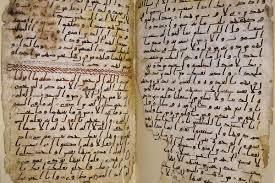Scholar Rejects Claims that Birmingham Manuscript Shows Quran Predates Islam

Fragments of what is said to be the oldest version of the Quran were found in Birmingham inside another Quran from the late seventh century.
Oxford University researchers used carbon dating to find the pages were from 14 centuries ago.
Some historians have asserted that if Oxford’s dating is correct, the “Birmingham Quran” was created between 568 AD and 645 AD, while Prophet Muhammad (PBUH) lived between 570 AD and 632 AD.
“It destabilizes, to put it mildly, the idea that we can know anything with certainty about how the Quran emerged — and that in turn has implications for the history of Muhammad and the Companions,” historian Tom Holland told The Times.
Iranian scholar Hojat-ol-Islam Seyed Mohammad Ali Ayazi rejected the idea, questioning the accuracy and precision of carbon dating.
Experts know that carbon dating has a margin of error of 50 to 100 years, he noted.
Moreover, he stated, the dating can roughly show when the skin was removed from the animal not when the text was written on the parchment.
Hojat-ol-Islam Ayazi also noted that in the past, parchments were reused several times, that is, things were inscribed on them and then old texts were replaced by new ones.
Many other Muslim and non-Muslim scholars have also disputed the claims that the ancient fragments predate Islam.
Confessing that the carbon dating was not always reliable, Keith Small, from the University of Oxford’s Bodleian Library, said that dates announced last month applied not to the ink but to the parchment.
Questions surrounding that accuracy of the carbon analysis were raised earlier by Saudi and Turkish scientists.
Saudi scholars and archaeologists refuted Birmingham claims about discovering the Quran oldest copy, asserting that the red ink used to separate between chapters was not used during the era of Prophet Muhammad (pbuh).
Therefore, they suggested that the manuscript might possibly be from the time of Othman Bin Affan who became Caliph many years after the death of the Prophet Muhammad (pbuh).
Halit Eren, General Director of the Research Center for Islamic History, Art and Culture (IRCICA), raised similar concerns.
Mustafa Shah, from the School of Oriental and African Studies, in London, said it was important to be wary of revisionist claims.
“If anything, the manuscript has consolidated traditional accounts of the Quran’s origins,” he said.
The Quran is a revelation from God, the Creator of the worlds, so He is the original author.



